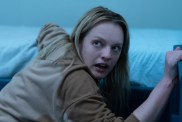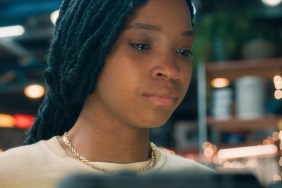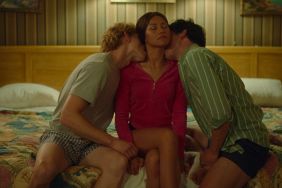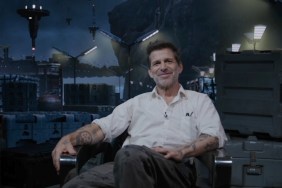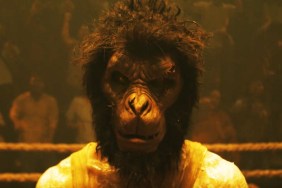Hugh Dancy and Jonathan Pryce represent two generations of British actors who come together in Tanya Wexler’s Hysteria, a very different type of biopic that tells the story of the invention of a device that 50% of the population are likely to know quite intimately even if it’s not something that’s normally talked about in polite company.
That’s because Wexler decided to base her period romantic comedy around the origins of the vibrator with Dancy playing Mortimer Granville, a physician in late 19th Century London who takes a job working for Pryce’s Dr. Robert Dalrymple, a man who uses unconventional techniques to cure women suffering from an affliction known as “hysteria,” but what we know today to be common horniness. The side effects of pleasuring women to cure them of their sexual urges–blisters, calluses, etc–convinces Granville to come up with an easier method along with his inventor friend Edmund St. John Smythe (Rupert Everrett).
The movie also stars Maggie Gyllenhaal and Felicity Jones (Like Crazy) as Dalrymple’s two daughters – the former one who may suffer from hysteria herself because she’s so outspoken and free-spirited.
ComingSoon.net spoke with Dancy and Pryce last week, and while it probably would make more sense to start with Dancy, the film’s star, we’ve decided instead to share the interviews in chronological order because that works better for continuity.
First, we have veteran British actor Jonathan Pryce who plays Dancy’s boss and future father-in-law. Known for his role as Governor Swann in the first three “Pirates of the Caribbean” movies and one of our personal favorites, Terry Gilliam’s Brazil. Pryce had been in New York doing a play at the Brooklyn Academy of Music called “The Caretaker,” which has been getting rave reviews. Later this summer, Pryce will also be returning for the sequel G.I. Joe: Retaliation, playing the President of the United States (as well as a Cobra baddie) and we talked to him a little bit about that as well.
ComingSoon.net: I guess when you tell people the premise for this movie they probably give you a questionable look, so what was the pitch that got you interested in this? Or did they just send you the script?
Jonathan Pryce: I suppose it was unfortunate that the script came cold, and I knew nothing about it, knew nothing about Tanya. I read it and was very doubtful about (Laughs) wanting to be a part of it because I didn’t know how it was going to pan out. It could’ve been – I always think of the image, you know the “Carry On” films? This could’ve been like a “Carry On” up the vibrator kind of a sex romp, you know? Quite smutty full of innuendo. Then I met Tanya and realized, yes, it was going to be a smutty
and we got on really well. I suppose that when I met her and saw whose hands it was going to be in and her take on the script, I felt much more confident about taking on the role of the doctor, except that I then had that script for four years just sitting on the desk. I think I might have thrown it away a few times thinking, “This was never going to get made.” Each year, Tanya would be in touch saying, “Yes, it’s going to happen this year. We’ve got so and so,” and then that would fall apart at the last minute. She had it for seven years. I think in many ways, it was a good thing that came out of it. You don’t want to wait seven years, but by the time it got to be made, people were ready. People had thought about it a lot, and the script, I thought what it is, it works out, it’s a really, really good script. We shot the script. There was no fudging – “Is this going to work? Is that going to work? Would I say this? Would I not say that?” You kinda knew that you were going to spend the next six weeks fulfilling this really good script.
CS: Had the script changed a lot in those four years?
Pryce: No, not, not very much, no. One of the first things I thought about when I read it was
I have three now grown-up children, but my daughter was then in her teens, and I remember thinking, “I don’t know if I want my daughter to see me doing this film.” I didn’t want to embarrass her and her friends and stuff. Then, by the time it was a go, and my agent reminded me of how worried I was about my daughter seeing it, and this was four years ago, and I said, “Nah, she’s fine.” (Laughs) She’s older now. She actually worked on the film. She’s at drama school now, but then she worked in the locations department. So the idea of going from my fear of her seeing this movie to saying, “Yeah, come on and work on it.”
CS: Usually young actresses don’t want their fathers to see their movies for one reason or another and this is quite the opposite.
Pryce: Yeah, that’s true, yeah.
CS: Is Tanya British too?
Pryce: She’s American – Chicago. The screenplay, they’re American writers, and the main producer is American. We have our English producer – made in London and Luxembourg. I’ve done things written by Americans set in England and directed by Americans, and you’re aware that they don’t quite get it right. There’s one too many red buses passing through the shot and those endless shots of Houses of Parliament or something. But we had a great British production designer, so all that awareness and sensibility of Victorian England was very well realized. Also, those women’s issue that you’re dealing with at the time, women’s suffrage and the treatment of women supposedly suffering from hysteria, is a kind of universal theme and it goes between America and England. It’s not a specific English issue. No, but Tanya was great to work with. We had very little time, you know, we shot this in six weeks. Three weeks mostly exteriors in London, and then most of the interiors were in a studio in Luxembourg. I went from six weeks of that to three-and-a-half months on “G.I. Joe,” which was extraordinary. (laughs) Even “G.I. Joe,” the budget was reduced on what “G.I. Joe One” had been. I think you find it at any level, once you start shrinking the budget, what it does is focus the mind. You know you’ve got six weeks to shoot this film, and you’ve got some of the best people in the business working on it. You shoot exactly what you want. The sets are just what you need. There’s no, “Oh, maybe this’ll work, maybe this. Let’s shoot it and see if it works out, we’ll put it in later.” It doesn’t happen. I even found that on “G.I. Joe” that the concentration on getting the script right from the start. You could shoot more on “G.I. Joe” than you did on “Hysteria,” but it seemed to be incredibly well focused. I did have–to talk about “G.I. Joe” for a bit–I had one of the best working experiences I’ve ever had because those Hollywood machines can just run away with you and you can end up having a miserable time. But because of the director, Jon Chu, and because of Tanya – they’re intelligent people and they have an awareness of what’s around them. It’s not all about them. They’re both very generous directors and very creative people.

CS: The cast for this movie is a really amazing. Had you worked with some of these actors before?
Pryce: Some of my patients I worked with, some of the older women. (laughs)
CS: I was going to ask, because those scenes must have been kind of awkward, so maybe it was good that knew some o them.
Pryce: I didn’t know Georgie Glen. Anna Chancellor, I knew. Funny enough, Anna Chancellor
I didn’t treat Anna. Hugh Dancy treated Anna, which was fortunate because Anna had once played my daughter in a film. (Laughs) That’s taking it a little too far. The treatment scenes, the way they were handled, we approached them seriously, and we didn’t think, “Oh, this is going to be funny,” or this is going to be whatever. The job of the day was to treat a woman in the way that they were treated and you got on with it. You knew it was going to be hopefully funny, but we didn’t play it for laughs. I find that the straighter you play it and the more committed you are to playing it as a committed doctor, and it all just takes care of itself. You find everything you say has a double entendre. What was gratifying about seeing this film in Toronto was seeing and hearing 2,000 people laugh from beginning to end, and just getting it. It was great. The straighter the scene was, the more committed I was to my work as a doctor, the bigger the laugh. But if you played it for laughs, it wouldn’t.
CS: It would be like “Carry On,” as you said.
Pryce: Yeah, yeah, you’d have found a laugh, but it would’ve been different, because there’s an air to, “I can’t believe that they’re saying this. I can’t believe they’re doing this.” You find it’s a mixed audience, but it was a bit like when I went to see “Bridesmaids.” The predominant laughter was from the women in the audience, and yet men – I loved that film. I laughed a lot. But to hear women laughing in “Hysteria” is pretty satisfying, I admit.
CS: You’ve done a lot of period pieces. When you do a movie like this, did you do any research at all?
Pryce: Nah, ’65. I was there, mate. Well, the research that we talked about with Tanya – because she’d done a lot of research and she had every kind of vibrator for over the years and kept being sent.
CS: As part of “research,” of course.
Pryce: Yeah, yeah, oh yeah. She arrived in London for the read-through with a suitcase full of vibrators. (laughs) She was dreading being stopped by customs, because once the word was out that this was the kind of film she was making, every vibrator company in the world sent her samples. The read-through was like this, and we all had a little parcel in or places and I wondered what on earth it was when I opened it–we all had our personal vibrator. When you do the research and you look at the books and you see the illustrations, it is extraordinary to think that this really happened, and that–apart from the fact that women were being treated this way–the early vibrator machines looked kind of like hand drills, and hair dryers and things. They’ve become more refined, but you saw advertisements for them in magazines.
CS: Yeah, they have those ads in the press notes. They’re hilarious.
Pryce: Yeah, yeah. When the film is shown, and they’re illustrated on the credits, people are still laughing at the credits because there’s images throughout.
CS: It’s pretty amazing, because you’d think it would be hard to get a movie made about this subject, and the fact it took seven years, it’s really fortuitous when a movie like this works after so much time is put into it.
Pryce: Yeah, thank God.

CS: It must have been interesting to go from this to “G.I. Joe.” Do you have a preference about doing period or modern films?
Pryce: No, I don’t. I don’t. I mean, I find that period films, just simple things like once you start wearing the costume and the stiff collars or whatever, it tells you a lot about your character and about society. Oddly enough, just thinking now about how costume places people in their class, and you see that in “Hysteria.” But, when I saw what was that George Clooney film that everybody else loved? “The Descendants.” It was set in Hawaii, and they were all in casual clothes. I couldn’t tell who was really was in charge, who had the power, all that stuff. Oh, that’s what it’s about. It’s about him talking to other family members, because normally, if it was in L.A. or any other city, he’d be a man who would normally wear a suit. So, I didn’t get any of that class thing or who they were.
CS: Right, that’s a big difference between the times of back then and now.
Pryce: So, that was just sort of an illustration of how the costumes tell you who they are. And “G.I. Joe,” little things like you’d put the little flag in here (points to his lapel) and you suddenly think, “Oh, I’ve seen that guy. I know the guy who wears the flag there.” He’s usually the President. (Laughs) Yeah, it’s that old story, that powerful people, you know who they are because of the way everybody else reacts to them. If Obama walked in a room and nobody looked up, you’d think he was just somebody part of a machine somewhere. When he walks in the room and a band plays, you know, “Oh, that’s the President,” or everybody stands up, and all that stuff.
CS: I was in Vegas recently and Jon Chu showed some “G.I. Joe” footage and I got to watch a scene of you playing opposite yourself. I’m not sure if you’ve seen it yet.
Pryce: I’ve seen those bits, yeah.
CS: I was curious about shooting those scenes because I was excited to see you were back but also that you were in a lot of scenes with yourself.
Pryce: Well, that was quite rewarding and the other guy was very good, I discovered, the other me. (Laughs) Yeah, I had no complaints about working with that other actor. I just saw some of the footage. I did some more ADR yesterday and saw a bit of that scene, but I’m really looking forward to seeing it.
CS: Yeah, me too. I liked the Stephen Sommers movie and I’m curious to see what Jon did.
Pryce: I think this is better. I really do. Even just getting Bruce Willis in for a week, it gives it a bit of a lift, and I’ve seen bits of – well, the trailer, and I think, “Oh, I know what this kind of movie is like.” And The Rock is a rock. He’s a great guy. I didn’t know what to expect, but he’s a very solid man in every respect. Like super-nice, and he’s very bright and yeah, very generous.
CS: Do you have anything else planned after your stage run here in New York?
Pryce: I’m doing “King Lear” in London.
CS: “King Lear?” Oh nice. Is it after the Olympics?
Pryce: It’s after. I’ll do the rehearsing during the Olympics, but we have a World Shakespeare Festival in London, which is the cultural Olympics, they call it. So, I open the end of August in London.

Next, we have the star of the film, Hugh Dancy, who has been in New York, starring in the Broadway hit “Venus in Fur,” which will keep him busy through mid-June. He’s a very busy actor who seems to appear in movies in bits and spurts including indies like Adam, last year’s Martha Marcy May Marlene and Our Idiot Brother, as well as appearing on television shows like “The Big C.” Like Adam, starring in Hysteria is a pretty big leading role for Dancy and later this summer, he’s going to star in the NBC show “Hannibal” (based on the cannibal serial killer, not the ancient conqueror) which is likely to raise his awareness even further here in the States.
ComingSoon.net: What was your reaction when you first got the script?
Hugh Dancy: No, I think I got the tagline for it, just, “You’d be playing the inventor of the vibrator.” I actually had some idea of the background story to this movie. I mean, I was aware of the premise, but what I didn’t know was the tone that this movie would strike. I mean, which I think is really unique, that it tries to kind of wend its way in a kinda quirky fashion through comedy, through almost farce, through romantic comedy, even, I don’t know, social realism, if you’d like. But as soon as I sat down and read the script, that was what intrigued me, was the tone as much as anything else.
CS: We just spoke with Jonathan (above) and he was saying that the movie wasn’t really played like it was a comedy.
Dancy: Oh no, well, because I think that the worst thing you can do with this kind of comedy. Obviously, we try and freshen up the story with wit and so on, but the real central joke comes from these people not having the first idea of what they’re doing. It is not like they know, but they’re pretending or that they’re in denial, they don’t know at all. So, yeah, you have to have a straight face. I remember in an early version of the script, there’s a scene where Jonathan is demonstrating his procedure to me. There was a first version of the script when I’m kind of shocked and astonished at what I’m seeing. We kind of felt, “Well, no, the whole point is that he should just view it as a medical procedure and be fascinated and kind of politely interested.” That’s what kind of drives the movie. All the hard work was being done by the ladies on the plinth. Jonathan and my job was just to keep a straight face.
CS: Those scenes must’ve been either really hilarious to shoot or just completely awkward.
Dancy: (Laughs) No, they weren’t awkward, and the reason they weren’t awkward, I think, is down to the really brilliant actresses that were game to come in and do that, and very accomplished actresses as well. Georgie Glen, who plays the first lady who Jonathan demonstrates on, and ends up kind of galloping – actually I had worked with her several years ago in “Daniel Deronda,” in which she kind of played my mother figure. So it’s a fully Freudian development.
CS: That’s really funny because Jonathan mentioned there was another actress who played his daughter in another movie that you ended up performing on.
Dancy: (Laughs) Is that right?
CS: Yeah, it was, and he was so glad he didn’t have to do that.
Dancy: That would’ve been truly weird. I didn’t realize how nepotistic it would’ve been, but no, they all came in and they threw themselves into it. Also, I give a lot of credit to Tanya Wexler, the director, for keeping a very light, very fun atmosphere on set. It was pretty fast-paced because we didn’t have a very long shoot. If you don’t get the tone right, you make your job twice as hard. So, she was very good at that.
CS: I was actually kind of surprised she was American.
Dancy: Yeah, I could see that because I think the movie feels
I mean, it’s weird because one minute you’re thinking, “Well, I suppose it’s kind of an old fashioned, nice old British comedy,” and then you stop and you think of some of the scenes, and there’s nothing old-fashioned about that at all. But there’s something very sure about it. Some people have asked me, “Do you think it’s relevant that there’s a female director?” It’s hard to know what the movie would be like if it had been made by somebody else. What I would say though is that the movie is kind of playing on our notions of what British costume dramas are, and the Merchant Ivory films and so on, that we’ve all seen. It takes that and subverts it to some degree, so maybe it needed an American. That’s my theory.
CS: You said you knew about the story a little bit–I don’t know if it’s taught in school (Hugh laughed at this notion)–but did you do any of your own research into this at all or did you feel they did enough when they wrote the script?
Dancy: I thought there was plenty of research. I mean, let’s be clear, we took the very basic historical premise and then ran with it. What was more significant in terms of attention to detail was that we get elements of 19th century behavior correct and etiquette and so on. The reason for that being that if we had cut too many corners–not that it had to have a Kubrick level of focus on realism–but at least people feel like we really had placed it in that world in that era because if we hadn’t, we would’ve undercut all the comedy. There would be nothing funny about it. But I’ve done my fair share of costume dramas and adaptations – I know enough about that world and about the behavior that it wasn’t something I needed to kind of immerse myself in.
CS: I know Jonathan mentioned he’d known about this for about four years.
Dancy: Right. Jonathan was attached to this for a long time.

CS: Yeah, at what point did you come on? Did they already have Maggie and Rupert?
Dancy: You know, it went through various stages. Obviously Jonathan was attached, but I got involved the same year that we made the movie, earlier on in the year. In other words, 2010. I kind of hemmed and hawed, and I couldn’t do it for a while, but Maggie was involved. Then, when I came back to it, then Maggie had fallen out, then Maggie got involved with it. In a microcosm, I got a sense of what they must’ve had to go through to put the movie together. (laughs) I mean, I guess this is what you need if you’re making a movie like this, but it seemed at a certain point, everybody just became available at the same time.
CS: I mean, it’s really kind of amazing because the concept is something where you think it’d be a hard movie to get made, so it’s really fortuitous when you have a movie like this that you shoot it six weeks and it actually turns out probably better than anyone maybe expected.
Dancy: Yeah, I think it is. I mean, yeah, it works very well as a strange brew of different characters, different actors, different tones, like we were saying before. I mean, I don’t want to say it’s better than the sum of its parts because I think they wrote a fantastic script, but I think it definitely worked out very well. It makes you realize how many hoops you have to jump through to actually make a movie that succeeds on any level. It’s always kind of a miracle.
CS: Have you had a chance to see it with any of the festival audiences? I know it played at Toronto and Tribeca.
Dancy: I saw it at Toronto as well. I saw it at the premiere at the big public screening, and then I saw it at Tribeca here, too.
CS: Did you notice a very big difference in how audiences reacted in Canada and here?
Dancy: (Laughs) Well, the main difference I think was that in Canada, it was in a huge theater. (The Roy Thomson Hall) So, there was like two-and-a-half thousand people. It was a screening that was maybe even at 10 PM, so I got the impression that there’s a lot of people there, all quite excited. They’d all maybe had a drink or two, and it was probably the biggest audience that this movie will ever get because there aren’t many theaters that size. We sat in the middle of that, and it was raucous. I mean, they were literally rolling in the aisles. It was incredible. Then, I saw it in Tribeca with I guess maybe a more respectful kind of movie-going connoisseurs, and but they also seemed to love it, but there were just fewer of them, and they weren’t drunk.
CS: That you know of.
Dancy: (Laughs) That I’m aware of, yeah.
CS: You’ve been bouncing back and forth between period pieces and modern movies like “Adam” and “Martha Marcy,” so do you have a preference?
Dancy: Not at all. No, not at all, except for the fact that I like all of them. I mean, I think there is a good version of any type of a genre movie, and I’m interested to be in that good version if I can.
CS: I don’t know if you’d consider something like “Adam” to be genre.
Dancy: I mean, maybe it’s not genre. “Martha Marcy” again now, I suppose what I mean is there’s no particular style, setting or tone that I am looking for, or even necessarily I feel most comfortable in. I mean, there are probably certain types of movie that I can’t do, and I’m not the kind of actor that I feel I can necessarily support bad material or make it better. I need to be pretty picky, or at least want to be pretty picky. With something like “Martha Marcy May Marlene,” I read the script. I was very, very taken by the script, but wasn’t quite sure whether I would fit into it, and then met Sean (Durkin, director), and on the basis of that, this was a guy you just want to work with. Then I felt great. You throw caution at the wind and see where it takes you. I mean, the truth is that with a movie like that, which was substantially smaller than this movie–I mean, not to sound too cynical about it – but you’re running a very, very small kind of a risk because essentially those movies, if they don’t succeed, just vanish. Obviously you don’t spend your life doing movies that vanish, so that’s why I’m quite careful about the ones I do.
At this point, we began to talk to Dancy about his upcoming NBC show “Hannibal” based on the Dr. Hannibal Lecter character created by Thomas Harris, which you can read more about here. (Dancy will be playing FBI agent Will Graham.)
CS: You’ve done television periodically over the course of your career. Do you like it because of the stability?
Dancy: It’s not so much the stability of it, because I think that if you are doing a pilot, of course you’re not probably having any stability. In this case, yes, it seems potentially more stable, but no, it’s more about telling a longer story, living with a character for longer.
Hysteria opens in New York and Los Angeles on Friday, May 18.
(Jonathan Pryce photo: Ian Wilson/WENN.com)


